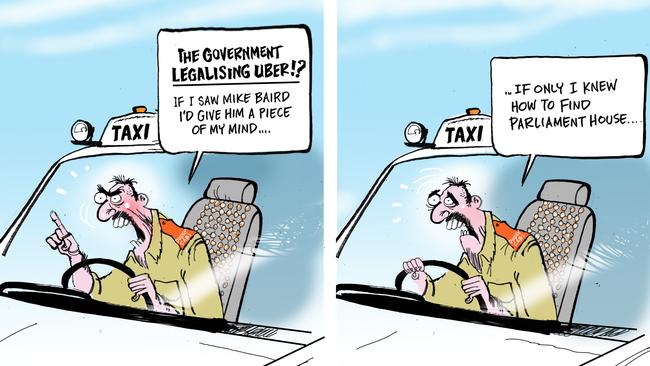Jim Triantafyllou: The taxi industry will stand face-to face with competitors like Uber, but not with one arm tied behind its back
THE taxi industry in South Australia is not opposed to change or competition. But taxi drivers don’t want new services like Uber to be given an unfair advantage.

Opinion
Don't miss out on the headlines from Opinion. Followed categories will be added to My News.
THE taxi industry in South Australia is not opposed to change or indeed competition.
The difference between past challenges and those now facing the sector relating to the introduction of ridesharing is the absence of a level playing field.
The taxi industry is proud of its provision of a safe, effective and reliable transport service for the travelling public and as such is happy to stand face-to-face with legitimate competitors, but not with one arm behind its back.
The State Government decision to allow ridesharing operators, including global multi-billion dollar giant Uber, to pay only a nominal $85 licence fee is a hit for the many small ‘‘mum and dad’’ owners of a single plate in the taxi industry.
Some of those very people bought licence plates from the State Government in good faith as recently as 12 months ago for up to $320,000. Then there are the taxi operators, many of whom are leasing licences for about $20,000 a year.
To make matters worse, the license fee for chauffeured vehicles, which had been $1912, has also been dropped to $85.
In addition, ridesharing vehicles will have an age limit of 8 years, compared with 6.5 years for the taxi industry, and they will also pay significantly less in Compulsory Third Party (CTP) insurance.
In acknowledging the impact the taxi industry will feel, the Government has recognised a requirement for compensation, and has offered some financial assistance in the form of a $30,000 payment for each privately-owned taxi licence and $50 a week for license lessees for a maximum of 11 months.
Taxi Council SA is pleased that its call for a fair go has been recognised, but it does not support the funding of that payment by way of a $1 levy on all metropolitan trips across all platforms.
In fact, we are very firm in our view this is not a cost which should be passed onto the travelling public, but rather should have been funded through an increased license fee on ridesharing.
Multinational ridesharing enterprises are multi-billion dollar businesses. They should be paying their way and paying the $1 levy — not the consumer.
The taxi industry will continue to assess the likely impact of the reforms and will continue to consult with Government, as has been the case in the past.
But in the meantime it will continue to focus on those elements that stand it apart from its competitors, both new and old.
The taxi industry will maintain its commitment to safety as a high priority, with continuous, sophisticated GPS monitoring and tamper-proof CCTV surveillance (both inside and outside the cab) with audio.
With innovative new products such as ‘‘ihail’’, which will give customers access to the closest cab and quicker service, the taxi industry will also deliver improved service.
Importantly, when hailing a cab, customers will not be subject to price surging, as they would with Uber.
In the end the consumer will decide.
Jim Triantafyllou is the President of Taxi Council SA


